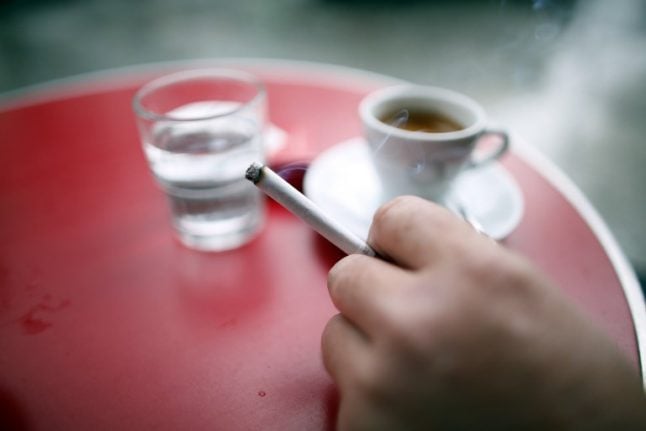The cost of lighting up at a French sidewalk cafe may finally dissuade even the most ardent smoker, if Prime Minister Edouard Phillippe gets his way.
With 80,000 tobacco-related deaths in France each year, “doing nothing is not an option,” Philippe said Tuesday, announcing a plan to raise the price of a packet of cigarettes to 10 euros ($11.3) from the current seven euros.
Tobacco “is the leading cause of preventable death, and daily use is growing among adolescents,” the premier said in a speech to parliament.
Philippe did not give a timeline for the price hike, which he said would be accompanied by “a merciless fight against traffickers who undermine this policy.”
French smokers already pay some of the highest prices for cigarettes in the European Union, surpassed only by Britain and Ireland.
In Ireland the price of a pack was raised to €10 back in 2014.

Around 80 percent of the cost of a pack goes to the government in tax, bringing in 14 billion euros in revenue each year.
President Emmanuel Macron, elected in May, said on the campaign trail that he was open to raising the price of a packet of cigarettes to 10 euros, but he also urged neighbouring countries to follow suit to avoid smokers shopping around for deals.
Opponents of the move have already expressed concerns that the price hike will just lead to the French shopping abroad for the tobacco fix and as a result boost the black market for cigarettes.
An estimated 16 million people smoke at least occasionally in France — about one in three aged between 15 and 85.
Smoking is a factor in around 78,000 deaths in France each year – making it the leading cause of premature death in the country.
But in line with most European countries, France is less keen on lighting up than it once was. Its annual health report shows that the number of people lighting up regularly is no greater than the 2013 WHO official European average of 28%.
Gerard Audereau, president of the anti-smoking group “Droits des Non Fumeurs” (Rights of non-smokers) tells The Local previously that 47 billion cigarettes are lit up in France each year, a steep drop from the 84 billion smoked in 2001.
These statistics would suggest that France seems to have an unfair reputation as the chimney of Europe.
Yet there are some worrying trends on France notably with higher than average rates of female and younger smokers.
Whereas Britain and Germany have halved the rate of smoking for young people, France's 2011 government health report reveals that French teens and students are still smoking at an alarming rate: 29 % of students smoke in France, a whopping 9% higher than the overall rate of smoking in the UK.

Last year, the government introduced neutral cigarette packets covered with graphic health warnings. But The Local reported last month how, despite the plan packaging rule, figures showed that smoking was actually on the rise.
In March alone the French bought four million packets of cigarettes, over four percent more than during the same period last year.
President Emmanuel Macron, elected in May, said on the campaign trail that he was open to raising the price of a packet of cigarettes to 10 euros, but he also urged neighbouring countries to follow suit to avoid smokers shopping around for deals.
Opponents of the move have already expressed concerns that the price hike will just lead to the French shopping abroad for the tobacco fix and as a result boost the black market for cigarettes.
READ ALSO:
The French and smoking: Is France really Europe's Chimney?




 Please whitelist us to continue reading.
Please whitelist us to continue reading.